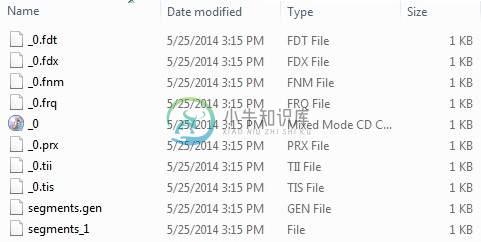删除文件(Delete Document)
删除文档是索引过程的另一个重要操作。 当已经索引的内容被更新并且索引变得无效或索引变得非常大时使用该操作,然后为了减小大小并更新索引,执行删除操作。
我们删除包含Field(s) Document(s)到IndexWriter ,其中IndexWriter用于更新索引。
我们现在将向您展示一种逐步的方法,并让您了解如何使用基本示例删除文档。
从索引中删除文档
请按照以下步骤从索引中删除文档 -
Step 1 - 创建删除过时文本文件的Lucene文档的方法。
private void deleteDocument(File file) throws IOException {
//delete indexes for a file
writer.deleteDocument(new Term(LuceneConstants.FILE_NAME,file.getName()));
writer.commit();
System.out.println("index contains deleted files: "+writer.hasDeletions());
System.out.println("index contains documents: "+writer.maxDoc());
System.out.println("index contains deleted documents: "+writer.numDoc());
}
创建一个IndexWriter
IndexWriter类充当在索引过程中创建/更新索引的核心组件。
请按照以下步骤创建IndexWriter -
Step 1 - 创建IndexWriter的对象。
Step 2 - 创建一个Lucene目录,该目录应指向要存储索引的位置。
Step 3 - 初始化使用索引目录创建的IndexWriter对象,该目标是具有版本信息和其他必需/可选参数的标准分析器。
private IndexWriter writer;
public Indexer(String indexDirectoryPath) throws IOException {
//this directory will contain the indexes
Directory indexDirectory =
FSDirectory.open(new File(indexDirectoryPath));
//create the indexer
writer = new IndexWriter(indexDirectory,
new StandardAnalyzer(Version.LUCENE_36),true,
IndexWriter.MaxFieldLength.UNLIMITED);
}
删除文档并开始重新编制索引过程
以下是删除文档的方法。
deleteDocuments(Term) - 删除包含该术语的所有文档。
deleteDocuments(Term[]) - 删除包含数组中任何术语的所有文档。
deleteDocuments(Query) - 删除与查询匹配的所有文档。
deleteDocuments(Query[]) - 删除与数组中的查询匹配的所有文档。
deleteAll - 删除所有文档。
private void indexFile(File file) throws IOException {
System.out.println("Deleting index for "+file.getCanonicalPath());
deleteDocument(file);
}
例子 Example Application
为了测试索引过程,让我们创建一个Lucene应用程序测试。
| 步 | 描述 |
|---|---|
| 1 | 在Lucene - First Application章节中解释,在cn.xnip.lucene包下创建一个名为LuceneFirstApplication的项目。 您还可以使用在EJB - First Application章节中创建的项目本章来理解索引过程。 |
| 2 | 按照Lucene - First Application章节中的说明创建LuceneConstants.java,TextFileFilter.java和LuceneConstants.java,TextFileFilter.java 。 保持其余文件不变。 |
| 3 | 创建LuceneTester.java ,如下所述。 |
| 4 | 清理并构建应用程序以确保业务逻辑按照要求运行。 |
LuceneConstants.java
此类提供可在整个示例应用程序中使用的各种常量。
package cn.xnip.lucene;
public class LuceneConstants {
public static final String CONTENTS = "contents";
public static final String FILE_NAME = "filename";
public static final String FILE_PATH = "filepath";
public static final int MAX_SEARCH = 10;
}
TextFileFilter.java
此类用作.txt文件筛选器。
package cn.xnip.lucene;
import java.io.File;
import java.io.FileFilter;
public class TextFileFilter implements FileFilter {
@Override
public boolean accept(File pathname) {
return pathname.getName().toLowerCase().endsWith(".txt");
}
}
Indexer.java
此类用于索引原始数据,使其可以使用Lucene库进行搜索。
package cn.xnip.lucene;
import java.io.File;
import java.io.FileFilter;
import java.io.FileReader;
import java.io.IOException;
import org.apache.lucene.analysis.standard.StandardAnalyzer;
import org.apache.lucene.document.Document;
import org.apache.lucene.document.Field;
import org.apache.lucene.index.CorruptIndexException;
import org.apache.lucene.index.IndexWriter;
import org.apache.lucene.index.Term;
import org.apache.lucene.store.Directory;
import org.apache.lucene.store.FSDirectory;
import org.apache.lucene.util.Version;
public class Indexer {
private IndexWriter writer;
public Indexer(String indexDirectoryPath) throws IOException {
//this directory will contain the indexes
Directory indexDirectory =
FSDirectory.open(new File(indexDirectoryPath));
//create the indexer
writer = new IndexWriter(indexDirectory,
new StandardAnalyzer(Version.LUCENE_36),true,
IndexWriter.MaxFieldLength.UNLIMITED);
}
public void close() throws CorruptIndexException, IOException {
writer.close();
}
private void deleteDocument(File file) throws IOException {
//delete indexes for a file
writer.deleteDocuments(
new Term(LuceneConstants.FILE_NAME,file.getName()));
writer.commit();
}
private void indexFile(File file) throws IOException {
System.out.println("Deleting index: "+file.getCanonicalPath());
deleteDocument(file);
}
public int createIndex(String dataDirPath, FileFilter filter)
throws IOException {
//get all files in the data directory
File[] files = new File(dataDirPath).listFiles();
for (File file : files) {
if(!file.isDirectory()
&& !file.isHidden()
&& file.exists()
&& file.canRead()
&& filter.accept(file)
){
indexFile(file);
}
}
return writer.numDocs();
}
}
LuceneTester.java
该类用于测试Lucene库的索引功能。
package cn.xnip.lucene;
import java.io.IOException;
public class LuceneTester {
String indexDir = "E:\\Lucene\\Index";
String dataDir = "E:\\Lucene\\Data";
Indexer indexer;
public static void main(String[] args) {
LuceneTester tester;
try {
tester = new LuceneTester();
tester.createIndex();
} catch (IOException e) {
e.printStackTrace();
}
}
private void createIndex() throws IOException {
indexer = new Indexer(indexDir);
int numIndexed;
long startTime = System.currentTimeMillis();
numIndexed = indexer.createIndex(dataDir, new TextFileFilter());
long endTime = System.currentTimeMillis();
indexer.close();
}
}
数据和索引目录创建
我们使用了record1.txt中的10个文本文件到包含学生姓名和其他详细信息的record10.txt,并将它们放在目录E:\Lucene\Data中。。 索引目录路径应创建为E:\Lucene\Index。 运行此程序后,您可以看到在该文件夹中创建的索引文件列表。
运行程序 (Running the Program)
完成源,原始数据,数据目录和索引目录的创建后,您可以编译并运行程序。 为此,请保持LuceneTester.Java文件选项卡处于活动状态,并使用Eclipse IDE中提供的“运行”选项或使用Ctrl + F11编译并运行LuceneTester应用程序。 如果您的应用程序成功运行,它将在Eclipse IDE的控制台中打印以下消息 -
Deleting index E:\Lucene\Data\record1.txt
Deleting index E:\Lucene\Data\record10.txt
Deleting index E:\Lucene\Data\record2.txt
Deleting index E:\Lucene\Data\record3.txt
Deleting index E:\Lucene\Data\record4.txt
Deleting index E:\Lucene\Data\record5.txt
Deleting index E:\Lucene\Data\record6.txt
Deleting index E:\Lucene\Data\record7.txt
Deleting index E:\Lucene\Data\record8.txt
Deleting index E:\Lucene\Data\record9.txt
10 File indexed, time taken: 109 ms
成功运行程序后,您的index directory中将包含以下内容 -


